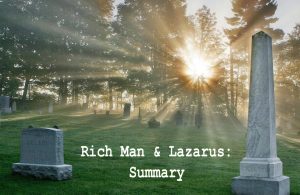 After you have shown the Witnesses the inconsistencies and contradictions in the Watchtower’s interpretation of the rich man and Lazarus account, you can tell them why your own understanding makes more sense to you.
After you have shown the Witnesses the inconsistencies and contradictions in the Watchtower’s interpretation of the rich man and Lazarus account, you can tell them why your own understanding makes more sense to you.
I suggest making the following points:
- If the rich man and Lazarus really are dead, as Jesus said, that would explain his references to “being buried” and “rising from the dead.” It would also explain why neither Lazarus nor the rich man can go give a warning to the five brothers.
- The rich man seems to want his five brothers to avoid coming to the place of torment. Yet he doesn’t repent and join Abraham and Lazarus in order to end his own torment, and they never try to persuade him to do so. That leads me to believe that after a person dies, it is too late for him to repent. He can’t get to God’s side, nor can anyone from God’s side get to him to help him.
- Although the rich man describes his torment in terms of agony in flame, he is not screaming in pain as he would if he were actually on fire. He describes his agony in terms of extreme thirst. That leads me to believe that his punishment is like a longing that never gets satisfied.
- In view of what Jesus says here, you believe that Ecclesiastes 9:5 should be interpreted as the mistaken worldview of the human narrator rather than as being God’s viewpoint. After all, in Ecclesiastes 9:5 the narrator says the dead “have no further reward,” and that certainly isn’t consistent with God’s revelation elsewhere in the Bible.
You can summarize your view of the passage by giving the Witnesses the points I outlined in the first post in this series:
- Physical death is not the end of our existence.
- When people die physically, they continue to have thoughts and emotions.
- Some people who die experience paradise.
- Some people who die experience torment and anguish comparable to a thirst that is never quenched.
- There is no second chance for salvation after physical death.
- People who experience torment and anguish after death want people they care about to repent before they die in order to avoid the place of torment.
- The dead cannot communicate with the living.
- The way of salvation is set out in the Bible.
Instead of asking them if they agree with you, conclude by asking, “Can you see why I would think this is a reasonable way to interpret the passage?”
If you get them to concede that much or if you have given them trouble in defending the consistency of the Watchtower explanation, you will have accomplished a great deal.
If you haven’t previously discussed Ecclesiastes 9:5 in detail with the Witnesses and they insist on using that verse as a proof text, you can respond with the suggestions I made in earlier posts on Ecclesiastes 9:5 and the book of Ecclesiastes as a whole.
When you sense that the discussion has reached its end, you can leave them with the question I suggested earlier, “If conscious existence after death is a false belief, why would Jesus use it in his story?”
Your turn:
Have you ever had a thorough discussion of the rich man and Lazarus story with a Jehovah’s Witness? Do you find the suggestions in these posts helpful?
Share your thoughts in the comments.

Leave a Reply
6 Comments on "Discussing the Rich Man and Lazarus: Explaining the Christian Understanding"
Thank you for this thorough analysis of the jw interpretation and all its flaws. I wish I knew all this when I first discussed it with them when they were trying to refute the existence of hell.
You’re welcome, Aurelie, and thank you for the kind words!
Thank you David – I found your researched prayerful answer comforting and reassuring. Thank you so much for your efforts to help JWs to awaken to salvation thru Christ not an organization with a false gospel and a false Jesus. Even though the JWs are shunning me I love them dearly. I hope to help awaken even just one to be saved. ❤️
Thank you, Betty! May God bless your love and your efforts to help JWs even though they are shunning you.